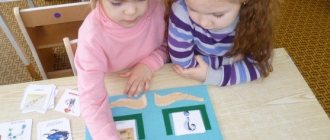There is no certain period of time during which one can and should intensively engage in the development of speech - and that’s it - as if by a wave of a magic wand, the baby took and spoke in whole sentences. This is a rather lengthy process and takes its own time for each individual child.
Parents lay the foundations on which knowledge and skills are laid like bricks. Speech development is not only dealt with from one to two years of age, until the child speaks - this is a process that has no clear boundaries. Many adults are actively developing and improving their speech and speech skills.
Factors on which speech development depends
Each child is individual, but psychologists and speech therapists identify four main factors that influence speech development:
- Anatomical features - the correct structure and functioning of the speech apparatus (tongue, palate, larynx, vocal folds), correct breathing.
As soon as the baby is born, he is immediately examined by a neonatologist and pediatrician, and during the first year of life by other specialists - a neurologist, dentist, etc. This is done in order to exclude various birth defects, to identify any diseases or predispositions in the early stages, and also prevent the development of the disease.
If deviations from normal development are detected, the doctor will be able to recommend correcting the anatomical defect, or preparing for subsequent correction. For example, a shortened frenulum does not allow the tongue to fully move in the oral cavity, and it does not reach the palate. Thus, it predetermines the occurrence of incorrect sound pronunciation.
- Physiological component. The connection between the brain and fine motor skills has long been proven - by developing small hands, you can activate speech centers.
There are a huge number of finger games and activities aimed at developing tactile sensations (various cereals, objects of different shapes and sizes, etc.). The most well-known and beloved game is “Magic Bag”.
- Emotional component. This is, first of all, a close emotional connection with mom and dad.
It is considered ideal for a child to communicate with grandparents (on both sides), brothers and sisters. The more the baby communicates with his family, the faster he joins in the conversation with them (he will wink at some, “hug” at others, and say something to others).
- Social component. First, the baby begins to communicate with his parents by screaming, when this is the only way he can say that he is experiencing discomfort, then, when recognizing familiar faces, he fixes his gaze, begins to smile, reaches out with his arms, etc. Therefore, everything that the child does is important - be sure to express emotionally your joy, tenderness, admiration.
In addition, in addition to the above factors, many specialists (speech therapists, psychologists, speech pathologists) indicate the influence of the speech of others - especially correct from the point of view of phonetics. For example, if one of the parents “burrs,” then most likely the son or daughter will do this based on imitation of a significant adult. In this case, it is advisable to correct the pronunciation of the sound P in parallel between the child and the adult.
Early childhood and speech development
Early age (from birth to 3 years) is a special period in a child’s life. In terms of the intensity of development and the complexity of the tasks solved at this stage, the first years of life have no equal. This is also the most favorable period for mastering the basics of your native speech. What gets missed now may require double effort later!
Would it surprise you if we told you that a child's speech abilities begin to develop even before he is born? And this is exactly so. Let's find out what actually affects the development of speech in a baby.
What factors influence speech development
- Biological: heredity; correct structure and functioning of the central nervous system, speech centers in the brain, hearing and speech organs; healthy pregnancy and successful birth; healthy physical and mental development after birth.
- Social: a full-fledged speech environment from the first days of a child’s life, a favorable developmental environment.
How a child’s speech is formed from birth to 3 years
The baby learns to communicate with the outside world from the very moment of birth. Let's take a look at how the speech development of young children occurs during the first 3 years of a child's life.
Norms of speech development in children from 0 to 3 years old
- 0 – 2 months. Scream. The first form of communication for a child is crying. The baby cries when he is hungry, uncomfortable or tired.
- 2 – 3 months. Booming. Crying is replaced by cheering. The sounds “a”, “s”, “u” appear, sometimes in combination with “g”. The child learns to understand speech addressed to him and control his own sound intonations.
- 3 – 6 months. Babble. The baby begins to babble to himself and make sounds when addressed to him. Turns his head towards the sound. Freezes in response to a sudden loud sound. Cries differently depending on needs: “I’m hungry,” “I’m tired.” Recognizes his name and reacts to it.
- 6 months. First syllables. From the age of 6 months, you can notice that the child prefers strictly certain sounds to all others: “ba”, “ma” (they are the easiest to learn to pronounce). He can repeat them endlessly: he likes the way they sound.
- 7 – 9 months. Combinations of syllables. The babbling progresses to the utterance of identical syllables: “ma-ma-ma”, “dya-dya-dya”, “ba-ba-ba”.
- 9 – 11 months . Onomatopoeia. The baby imitates the sounds of adults' speech. Responds to name. Understands the meaning of the word “no.”
- 11 – 13 months. The first meaningful words from two identical syllables: “dad”, “mom”, “baba”, “uncle”.
- 12 months. The baby shows interest and attention to the speech of others, repeats and combines sounds in a new way, combines them into “words”, imitating the speech of an adult. Understands and follows simple one-word instructions (“sit down”). He waves his hand “bye-bye”, shakes his head “no”. Uses gestures and sounds to attract attention. Interested in books.
Rarely does a parent know what signs indicate deviations in the child’s development. Therefore, for prevention, be sure to visit a pediatric neurologist at 3, 6, 9 and 12 months .
- 18 months. The baby easily repeats frequently heard words. Knows different parts of the body and points to them. Masters simple words (by the age of 2 years, their vocabulary can range from 20 to 50). Answers in words or gestures the questions: “Where is the bear?”, “What is this?” He loves when people read to him. At the request of an adult, he points his finger at the pictures in the book. 2 years. First sentences (two words). A two-year-old child can easily combine simple words mastered by the age of 2 into combinations: “Mom, give me,” “I want this,” “Where is the kitty?” Understands simple instructions consisting of two sequential actions: “Find your teddy bear and show it to grandma.” The vocabulary can expand to 150 - 200 lexemes, and others can already understand half of the words the child pronounces. The baby begins to use pronouns, adjectives and prepositions. Holds a book correctly in his hands. “Reads” to his toys.
- 3 years. Multi-word sentences (three or more words). At 3 years old, the period of early childhood ends. By this turning point, the child is able to compose sentences of three or more words. Distinguishes between colors and size definitions. Remembers and repeats familiar rhythms, melodies, stories. Some difficulties in sound pronunciation may still persist (whistling, hissing, vowel sounds). The vocabulary is expanding so much that parents can no longer accurately count how many words it consists of. In general, the baby is already ready to speak out on any occasion.
Who is faster: boys or girls
Of course, each baby is unique and develops at its own pace. In practice, a slight delay in speech development may turn out to be only an individual feature. Moreover, the rate of speech development can be affected by: illness, stress, lack of communication with surrounding adults, or the multilingual environment in which the baby grows up.
And it can still be very difficult to resist the temptation to compare your child with others. Why do some children at the age of 2 already read passages from “Moidodyr” from memory and speak in whole phrases, while others need another 1.5 - 2 years to be at the same level? Should I be worried about this?
In modern psychology, two types of children with normally developing speech are distinguished: “talkers” and “silent ones.”
- “Talkers” show increased activity and interest in the world around them. Such children love to tell stories, ask a lot of questions and easily get accustomed to new surroundings. Sometimes they start talking earlier than other children.
- “Silent people” tend to be contemplative. They always need to adapt to new surroundings. They may start speaking late, but almost immediately without defects. It is important for such kids to be heard and understood. Therefore, parents should try to respond carefully to the child’s questions. However, if the “silent child” has not begun to speak by the age of 2–3 years, you need to contact a specialist.
According to statistics, boys begin to develop speech later than girls. One of the reasons lies in physiology. Brain maturation occurs faster in girls. This affects the growth of vocabulary: by the age of 2, girls usually have twice as much vocabulary as boys of the same age. Plus, they are more emotional by nature and happily share all their impressions, while boys tend to show greater verbal restraint, speaking only “to the point.”
In addition, numerous studies have shown that the higher the child’s motor activity, the better speech development. It makes sense that more active kids might begin to demonstrate advanced language skills before their slower peers.
Playing with a child promotes speech development. Encourage him to move more, and the baby will happily pick up the game.
Types of speech
Speech can be active or passive:
- Active - the one that the baby uses. The child knows the words he has learned, can confidently pronounce them, and construct sentences with their help.
- Passive is the one that the child understands, but for certain reasons does not pronounce. For example, he may know the word “TV”, but not say it because it is difficult for him.
It is very important to develop both active and passive speech of a child.
Where does beautiful speech come from?
A child’s beautiful speech is the merit of his parents. It is advisable to develop conversational skills from childhood. This is facilitated by visiting a theater studio or poetry club, as well as constantly reading and learning poetry.
The childhood of the modern generation is inextricably linked with computers, which is why there is practically no time left for books. This is a very important shortcoming of many parents, because in the question of how to learn to speak beautifully, reading is indispensable.
Language and literature lessons at school make a significant contribution to the development of children's speech. If school teachers do not produce the desired results, parents must take matters into their own hands.
It is worth considering individual lessons with your child, or enrolling him in private lessons with another teacher who will help him develop the art of speaking freely on any topic.
But what if your parents missed out on the development of beautiful speech as a child? Don't get upset and think that you have no chance of learning to speak clearly. You can still catch up, it’s never too late to improve!
How to help develop speech by age
Up to a year old, the baby makes his first attempts to speak - he smiles in response to visual and verbal contact with adults, tries to say some sound or even repeat after mom or dad. Therefore, it is very important to focus on these attempts, smile, look at the baby, showing in every possible way that you are interested.
1-3 years. At this age, mothers and fathers, when communicating with a child, try (on an unconscious level) to speak to the baby in his language - briefly, understandably, clearly. Thus, the child understands what is being said to him, what he wants to say. Try to get rid of baby talk and empty repetition (such as “ba-ba”, “peek-a-boo”). The child must hear the words in full so that later he can say them the same way, and not shorten the syllables, rearrange them, distorting the meaning. Correct speech stimulates communication.
From 3 years and older. The most common opinion of most modern parents is that by sending a three-year-old child to kindergarten, the pace of communication can be slowed down, and all the necessary speech skills will be developed by the employees of the child care institution. This is wrong. Parental communication remains just as important, because it is in the family that the foundations of communication are laid, on which the rest of the acquired knowledge will be superimposed.
What to pay attention to
The development schedule for speech skills was given above. Children develop differently, and even the most talented talkers can only master all the necessary skills for their age group once they reach its upper limit. Therefore, the norms of timely development do not always serve as reliable guidelines for understanding whether a particular child is mastering speech correctly. We’ll take a different approach and tell you what should be the reason to contact a specialist:
- By the end of the 1st month, the baby does not cry before feeding;
- By the end of the 4th month he does not smile when spoken to and does not gurgle;
- By the end of the 5th month does not listen to music;
- By the 7th month, does not recognize the voices of loved ones, does not respond to intonations;
- By the end of the 9th month, there is no babbling and the child cannot repeat sound combinations and syllables after adults, imitating the intonation of the speaker;
- By the end of the 10th month, the baby does not wave his head as a sign of denial or his hand as a sign of goodbye;
- By the age of 1 year, the child cannot utter a word and does not fulfill the simplest requests (“give”, “show”, “bring”);
- By 1 year 4 months, cannot call mom “mom” or dad “dad”;
- By 1 year 9 months cannot pronounce 5–6 meaningful words;
- By the age of 2, does not show body parts that are named to him; does not comply with two-action requests (“go into the room and take a book”), does not recognize loved ones in photographs;
- At 3 years old, cannot retell short poems and fairy tales, cannot say his first and last name; speaks in such a way that others do not understand him; speaks very quickly, swallowing endings, or very slowly, drawing out words.
How to help young children develop speech
What can we, parents, do from the very birth of a child to ensure that he speaks naturally?
Let us remind you that the sensory channel for perceiving information about the external environment (vision, hearing, taste, smell and touch) is the main one for children in the first years of life.
Therefore, the answer lies on the surface: it is necessary to give the child as much information as possible about the world around him, as much as possible of any kind of sensory sensations and stimuli. Let's talk about it.
- Touch. Feeling #1 at first.
Mother's warm hands, her gentle touches, stroking, massage, gymnastics, toys of different shapes and textures, finger games - the more of this, the better.
Knowledge about oneself, one’s body and its sensations is formed through contact with the environment, so diversify the child’s tactile sensations as much as possible. Water of different temperatures (carefully!), soft fabric and rubber balls, a plastic rattle and a wooden cube, finger paints on a palette, sand in a children's sandbox, beans in a jar, etc. - the world is so rich for training your sense of touch!
- Hearing.
Give your baby as much information as possible that he can perceive by ear:
- sounds of music
- nature
- household appliances in the house
- street noise from the window
- sounds of native speech, etc.
Always talk to your baby about everything. Mom does this naturally, because speech accompanies any of her actions: she voices swaddling, feeding, bathing, and putting her to bed. She names objects surrounding the child, pointing at them.
When the baby starts to walk, the mother “keeps up the conversation”: she responds to the sounds the baby makes, repeats them and introduces him to adult speech, which the baby will try to imitate as he grows up.
- Vision.
We interest the baby in the objects around him so that he learns to focus his vision and maintain his attention on significant objects.
To help your child concentrate, you can hang bright colored objects above the crib (for example, balloons, fluffy pom-poms - they are quite light and will certainly attract attention).
Some mobile models come with removable toys to help adults provide a stimulating and varied space for their child. This is for the little ones.
Later, the arsenal of objects from the surrounding reality can be replenished endlessly, both due to toys in the house, and due to the visual impressions that the baby will receive when he is outside the home: on a city street, on a river, in a forest, in a zoo.
- Taste.
Mother's milk, water, teas, juices, pureed and solid food - what a variety of textures and tastes! Introduce your baby to them by gradually expanding the range of products that you introduce into baby food. The sooner a child becomes familiar with basic tastes, the less picky he will be in food later.
How to make your speech beautiful
First of all, in your quest to learn how to speak correctly, you need a responsible approach and a clearly developed strategy. It will also be useful for you to follow several rules in the process of improving your speech:
×
- Eliminate parasitic words from circulation.
- Read fiction.
- Constantly enrich your speech with new words.
- Deal with diction or pronunciation defects.
- Listen to beautiful and correct speech.
- Retell what you read or heard.
- Avoid tautologies. Highlight the main thing.
- Develop memory
- Dealing with public fear
These tips seem simple, but only constant adherence to them will lead to the desired result. You can deliver a speech without outside help, all you need is self-control and discipline.
Songs, rhymes and nursery rhymes for speech development in children 2 - 3 years old
These are perhaps the most effective, generation-tested ways of communicating with young children.
Basic principles:
- simple rhyme
- repetition of sounds or words
- small size
- accompaniment with gestures/actions
Rhyming poems can be told, or they can be sung using various melodies.
The main purpose of nursery rhymes, finger games, rhymes:
- emotional contact with the child
- development of his speech skills
- finger massage
- study of body parts
- assistance in establishing a routine
For example, by repeating the same rhyme before bedtime, you can develop in your child the expectation of a funny rhyme and the understanding that it is time for him to sleep.
IMPORTANT: Young children need consistency and order as this develops a sense of stability and security.
You can come up with or choose from the many available nursery rhymes, one for different occasions:
- morning hygiene procedures
rhyme for washing
- changing baby's clothes
rhyme when changing clothes
- preparation for swimming
bath rhyme
- before gymnastics
rhyme for gymnastics
- finger massage
poem for finger massage
- before bedtime
bedtime poems
The classic nursery rhymes “okay”, “cockerel-comb”, “horned goat”, “white-sided magpie” and many others will also delight the baby and be useful.
Playing and learning to speak: role-playing games for children
Options for playing with a child are limited only by the parents' imagination. At the same time, the child often independently suggests what he wants to do, distributes roles and organizes the game. Your mission is to fill the game with detailed dialogues so that the game is not only exciting, but also useful for the development of the baby’s speech. It can be:
- Hide and seek The classic game of “peek-a-boo” with infants can gradually change. You can hide behind anything, attracting the child with the words “where is mom?”, “find mom.” As the child grows up, he will begin to enjoy hiding on his own, and you, with appropriate verbal accompaniment, will look for him.
- Role-playing games At first, these can be very simple games. For example, you can play with a toy phone, a child can call mom, dad, brother, sister, say “Hello,” find out “how are you?” and vice versa. Then you can role-play fairy tales, come up with stories yourself, using household items and toys
- “Guess” There are many variations of games. You can ask your child: “guess what I’m doing?” and show some action: combing your hair, pouring tea into cups. Or ask: “guess who I am?” and depict a bunny or a bear cub. You can show soft animals and ask: “guess who it is?”, “what does he like to eat”, “where does he live?” If the child cannot answer, you should give a detailed answer yourself, and after a while repeat the questions to the child
- Active games Nursery rhymes and songs can be used in active play with the child, encouraging him to repeat the corresponding actions along with the words. This, in parallel with speech skills, will develop both the child’s physical and musical abilities. Examples:
nursery rhyme with movements 1
nursery rhyme with movements 2
Speech formation: stages and recommendations
As the child grows and develops, he first pronounces individual sounds, then simple words (for example, “mom” or “dad”), and only then learns to speak more complex words. Speech development is a fascinating process that parents watch with great interest.
Speech development plays an important role in the overall development of the child. Knowing the specifics of this process and its main stages, you can understand how developed your child’s speech skills are. Let's take a closer look at them.
Speech development in a child
The foundations of speech are laid in a child during the first year of life, and the first three years of life are decisive in the development of speech skills. These skills develop in an atmosphere in which the child hears the sounds and speech of other people. Children under three years of age perceive language best, so developing speech skills at this age is extremely important.
Babies communicate by crying, for example when they are hungry or want their parents to come to them. As they develop, they learn to hear and understand the sounds of language and can express themselves using single words and short one-syllable sentences. The rate of development of speech skills is individual for each child.
Stages of development of language skills in children
Pre-speech stage
At this stage, the child learns to communicate with others. Most children begin to communicate with their parents at about one year of age. By this time, children understand most of what their parents tell them and can express their needs by pointing to specific objects.
It should also be noted that not all children develop language skills in the same sequence.
3–4 years
At the age of 3–4 years, a child usually has long and interesting, although sometimes meaningless, conversations with his parents. At this age, children's vocabulary increases and they begin to understand the basics of the grammatical structure of the language. They talk a lot and enjoy long conversations.
At this stage, there are certain indicators that indicate the child’s normal speech development:
1. The child quickly learns new words.
2. The child uses plural nouns, but may use verb forms incorrectly (for example, he may say “sells” instead of “sells”).
3. A three-year-old child speaks almost clearly and coherently:
- makes sentences of four or more words;
- knows and understands children's poems;
- uses pronouns correctly.
4. The speech of a four-year-old child is completely understandable, but sometimes there are minor inaccuracies. At this age the child:
- uses long and complex sentences;
- can tell long stories with the correct sequence of events;
- asks a lot of questions. The child’s speech is clear and understandable, without gross errors.
During preschool age, children typically have longer, more complex conversations with their parents.
5–8 years
By age 5, a child typically speaks grammatically correctly and demonstrates a large vocabulary. By age six, children can write simple stories and understand how sounds form words.
The indicators of a child’s speech development at this stage are as follows:
1. At the age of five, a child usually forms sentences grammatically correctly, but sometimes makes grammatical errors.
2. Five year old child:
- has a more extensive vocabulary;
- can express his point of view in discussions.
3. By the age of six, a child understands about 13,000 words.
4. A six-year-old child uses pronouns correctly and understands the difference between them.
5. By the age of seven, a child understands 20,000 to 26,000 words and can recognize errors in other people's speech.
6. At the age of eight, children make very few grammatical errors. They can have meaningful conversations with adults and follow complex instructions without repetition. They can read age-appropriate texts and write simple essays.
These are the main stages of children's speech development. However, some children reach certain milestones earlier and others later than usual. As long as you see progress in the child’s speech development, albeit small, there is no reason to worry. However, sometimes a child may not understand what is being said to him and may also have difficulty expressing his thoughts. This may indicate a language disorder in the child. Although such disorders can be a serious problem, they are treatable.
Speech disorders in children
To develop language skills, a child must have listening, understanding and remembering skills. Also, the child must be able to structure his speech. If these skills are not developed, it may be associated with speech disorders.
According to statistics, symptoms of various speech disorders are observed in 5% of all children. Speech disorders in children are different from speech defects, which involve the child's inability to articulate certain speech sounds. With speech disorders, children reproduce sounds normally and their speech is understandable. However, they face difficulties understanding the speech of others (receptive language) or expressing their own thoughts (expressive language).
How to determine if a child has problems with speech development?
Children suffering from receptive language disorder (also medically known as sensory alalia) may have difficulty with:
- understanding the speech of others;
- following instructions;
- organizing your thoughts.
Children with expressive language disorder (also known as motor alalia) have difficulty expressing their thoughts and needs:
- their sentences may be short and simple, and their speech unstructured;
- their vocabulary may be significantly smaller than that of their peers;
- It can be difficult for them to find the right word, they are able to fill pauses with various sounds or filler words (“umm”, “nuuu”, etc.);
- they may use grammatical forms of words incorrectly;
- they can repeat the same phrases in the same story.
One of the most serious language disorders is specific speech disorder:
- children have delayed speech development (for example, they may not be able to speak until they are three years old);
- at the age of three they may not speak clearly enough;
- Children are susceptible to difficulties using verbs in speech. This is the hallmark of a specific speech disorder;
- children may miss auxiliary verbs in sentences;
- Children confuse verb tenses.
Causes of speech disorders
Sometimes a child cannot develop speech production, listening, understanding and remembering skills for various reasons:
- The child does not hear enough live speech in everyday life. The more a child is immersed in a language environment, the faster he develops speech skills;
- some children experience difficulties only in the development of speech, while other areas of the psyche develop normally;
- The causes of expressive speech disorder are not fully understood. But sometimes such a disorder is associated with developmental delays;
- receptive language disorder can be caused by genetic disorders;
- mixed speech disorders can be caused by traumatic brain injuries;
- speech disorders can occur in children with developmental delays, autism spectrum disorders and hearing problems;
- A speech disorder such as aphasia (impairment of already formed speech) can occur due to damage to the central nervous system.
If your child has difficulty developing speech even at age three or older, consult a doctor to identify and promptly treat possible health problems.
Diagnosis and treatment of speech disorders
- the doctor should examine the family's medical history to find out whether family members have had speech disorders;
- the doctor can conduct tests for the child on the level of development of receptive and expressive speech;
- A hearing test or audiometry can help determine whether your child has hearing problems.
Speech therapy is the best way to treat speech disorders. Consultations with a psychologist or psychotherapist are also recommended, because speech disorders can lead to psychological problems.
How to develop speech in a child: useful tips
1. Talk to your child . Talk to him about general topics as much as possible. For example, you can start a conversation with abstract phrases: “We are going for a walk in the park. Do you see how the birds fly? Do you feel how the flowers smell?”
2. Read books to your child. It's never too early to start reading books to your child. Start with books for little ones, then as your child gets a little older, move on to fairy tales and short children's stories.
3. Turn on your child’s TV and computer as little as possible. Do not introduce your child to electronic devices from early childhood. To develop speech skills, a child needs to interact with people and hear live speech. TV cannot provide him with this.
4. Go for walks with your child. A walk to the park or museum together can open up a whole new world for him. The more a child interacts with the world around him, the more curious he becomes and the more questions he asks. You can talk to your child, encouraging him to share new experiences.
5. Set a good example . When talking to your child, stand opposite him. Speak slowly and clearly. If a child says a word incorrectly, do not scold him, but correct him by saying the word correctly. Knowing how to pronounce a word correctly, the child will learn.
6. Remember that you and your child have different levels of speech development. Don't use words or phrases that your child won't understand. If you nevertheless utter some word that is incomprehensible to the child, explain its meaning.
7. Adapt to the child. If he initiates the conversation, let him talk and explain. Support your child in such situations: even a simple pat on the shoulder will give him self-confidence.
8. Speak and repeat . If your child pronounces a word correctly, repeat it several times in different sentences to help him understand its meaning better.
9. Learn new words with picture books. Buy some picture books and help them learn new simple words (eg ball, tree, etc.). After that, show the picture that matches this word. Discuss the picture with your child.
10. Teach your child new words. Teach your child new words from time to time. Invite your child to come up with a sentence with a new word. It doesn’t matter if the child doesn’t immediately understand a new word. Sooner or later he will learn to use it correctly.
11. Ask your child questions. Do everything you can to help your child develop language skills. If you are walking in the park, find something that interests your child. Ask him questions and invite him to tell you what he sees.
12. Sing songs to your child and read poetry. The rhymes that are in poems and songs help the child better learn new words.
Bilingual atmosphere and child speech development
Sometimes it happens that a child grows up in an environment where two or more languages are spoken. And parents worry: will this situation lead to speech disorders in the child?
Experts answer this question unequivocally: no. Until recently, parents were encouraged to speak one language in front of their child. Psychologists believed that a bilingual environment could interfere with a child's ability to acquire language. It was also believed that a child learns to speak faster and easier in the language that is heard more often in the child’s environment. However, such assumptions have not found scientific confirmation. Moreover, there are many examples of young children growing up in a bilingual environment and successfully acquiring both languages.
If your child suffers from some type of developmental delay, don't despair. Spend more time developing his speech skills. If your efforts are not enough, seek professional help to cope with speech disorders.
Related links:
- The main stages of speech development in children
- Simple ways to teach a child to speak
- Speech development in a child: how to speed it up
- How to help a child start talking?
- Speech delay: myths and facts
- More articles on child development
What mistakes can parents make when developing their child’s speech?
Often the child is overly patronized and protected, they try to predict his desires - of course, out of love for him. But then the baby does not develop the desire to work independently, he does not learn to express his thoughts through speech, and many processes in his development may be inhibited.
• Intuition and love help loved ones understand a child literally at a glance. But communicating with unfamiliar people in unusual conditions will be difficult for him, and in the worst case, acutely uncomfortable. To prevent this from happening, as you grow older, you need to enter into conversations more often with new and new interlocutors, and then the child will simply be forced to improve his speech understanding skills.
• Some parents underestimate, while others overestimate, the requirements for the baby’s speech. In the first case, they do not demand anything from the child, all his wishes are guessed and immediately fulfilled, in the second, they constantly pester him: “Tell me!”, “Repeat!”. Sometimes in one family two extreme approaches are used at once: for example, dad demands, and grandmother takes care. This has a very adverse effect on the child’s speech development.
• Try to eliminate lisping, “baby talk,” and constant onomatopoeia when communicating with your baby. The parent's speech is a model for the child.
• Parents can speak very quickly or, conversely, too slowly, without pauses and different intonations, monotonously. It is important to use all the richness and diversity of language when developing a child’s speech.
• Do not try to speed up the baby's natural speech development. Avoid overwork from speech classes and memorization of poetry.
What else do you need to know about speech development?
Remember that speech development is a complex process and at some point failure may occur. Carefully monitor how your baby’s speech improves so that you can take corrective measures in a timely manner. Pay close attention to the critical periods of speech development. There are three of them:
- 1 critical period: from 1 year to 2 years. There is an active development of the areas of the cerebral cortex responsible for speech. During this period, the development of allalia (absence or underdevelopment of speech while maintaining mental abilities) and delayed speech development are possible. Now it is necessary to be very careful about the child’s behavior in the event of any head impacts or concussions.
- 2 critical period: 3 years. There is an active development of coherent speech. At this age, the risk of developing such deviations as mutism (the child spoke and suddenly “does not want” to respond to the addressed speech, does not try to start a dialogue) and stuttering increases. Now the baby needs a calm environment more than ever. It is worth monitoring your own speech - do not jabber, take pauses so that the child can speak out.
- 3 critical period: 6-7 years. During this period, a “disruption” of nervous activity may occur. This is fraught with the development of stuttering and childhood aphasia (partial or complete loss of previously present speech). Try to protect your child from stress and help him cope with the increased workload due to entering first grade.
Remember that speech development is associated with intensive work of the child’s nervous system. And this process will be much better in a calm and warm atmosphere. Protect your baby from worries, do not conflict with his family in front of him, talk to him kindly.
Read to your child more, moving from simple works to more complex ones. As soon as the child is able to express his opinion regarding the completed works, discuss each fairy tale or story after reading, invite the child to retell the content in his own words.
Adults need to monitor their own pronunciation and try to speak emotionally and expressively. This will not only allow the baby to master speech, but also use it for its intended purpose - as a subtle tool for expressing his own emotions.
In order for a child’s speech to develop correctly, it is necessary that he is constantly in a language environment. But don't overload him with information! It is better to use a few descriptive sentences and wait for the child's reaction, inviting him to "dialogue", rather than just chatting incessantly. For the same reason, do not replace personal communication with your child by watching cartoons and listening to audio fairy tales. Speech develops in dialogue!






